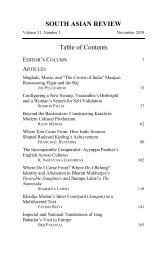2010 Winter Newsletter - South Asian Literary Association
2010 Winter Newsletter - South Asian Literary Association
2010 Winter Newsletter - South Asian Literary Association
You also want an ePaper? Increase the reach of your titles
YUMPU automatically turns print PDFs into web optimized ePapers that Google loves.
PAGE 19<br />
CALL FOR RESEARCH PAPERS ON INDIAN ENGLISH WRITING (PROSE, POETRY, DRAMA AND FICTION)<br />
NEWSLETTER<br />
Authentic, scholarly and unpublished research papers are invited from scholars/faculty/researchers/writers/professors from all over the world for this volume<br />
tentatively titled as Indian English Writing: Speculations and Observations.<br />
The volume will be published with an ISBN (International Standard Book Number) by a renowned Delhi based publisher.<br />
The articles should be on any theme of any work of Indian English Prose, Poetry, Drama and Fiction<br />
The paper should not usually exceed 11 pages maximum, 6 pages minimum in single spacing.<br />
Each contributor is advised to send full paper with brief bio-note, declaration and abstract as a single MS-Word email attachments to my email addresses:<br />
amnawale@gmail.com up to 15th Jan. <strong>2010</strong>. The contributors are also supposed to submit one hard copy of the same i.e. (i) Full paper (ii) A declaration (iii)<br />
Abstract and (iv) Brief bio-note to postal address given below. One hard copy is required for our record. Without hard copy no paper will be considered for<br />
publication.<br />
Postal Address to Send Hard Copy of Paper:<br />
Dr. Arvind Nawale,<br />
“Akshar”.<br />
Anand Nagar,<br />
Near Nanded Naka,<br />
UDGIR, Dist: Latur<br />
(M.S.) 413 517. India<br />
(For more information, please email Dr. Arvind.)<br />
——————————————————————————————————————————————————————————————————<br />
Call for Papers: 30 th Annual West Indian Literature Conference<br />
“I Dream to Change the World”:<br />
Literature and Social Transformation<br />
October 13-15 th , 2011<br />
University of the West Indies, St Augustine<br />
Caribbean culture and its productions continue to be critical instruments for imaginatively addressing the on-going imperative<br />
for social change and self-fashioning. George Lamming contends that the work of the Artist is to “return the society<br />
to itself” “to its past” and to the “visions of the future” on which the present is constituted. Although such a function was<br />
originally directed to a confrontation with colonialism’s systemic erasure or misrepresentation of its others, an engagement<br />
that is never quite exhausted, Caribbean nation states must now call themselves to account for the outcomes of their<br />
Independence projects.<br />
The region must engage new questions about the quality of life now available to its citizens. It must confront with urgency<br />
the many challenges arising from all spheres of life, from its political culture, economic circumstances, gender politics<br />
and family life, marginalised groups, youth culture and entertainment industries, foreign media infiltration, crime and<br />
violence. No longer is it acceptable to point the finger at the past or to an external “other” as a source of blame. Nation<br />
states must engage the new sites and agents of oppression or negative social conditioning generated from within and beyond<br />
its borders in order to ask ourselves more responsibly: what are the requirements of the future?<br />
Equally important to this process is recognising the unique contributions the region’s literature and cultural life have to<br />
offer. Caribbean writers have long been engaged in theorizing identity and culture beyond monolithic paradigms that are<br />
mired in race and ethnic prejudices and so are a rich resource for ideological and social change that has relevance to the<br />
world. These offer fertile methodologies for (re) reading cultures and literatures that have historically read the region as<br />
for instance Barbara Lalla has demonstrated in her Caribbean readings of medieval literature.<br />
Indeed debates about the function of literature, from which the practice of criticism can hardly be excluded, are as old as<br />
the medium itself. Issues have ranged from literature’s necessary independence from politics of activism and its role in the<br />
work of social protest and change. The inescapable politics of textuality remains as pertinent an issue as the concern with<br />
the reduction of literature to politics. For the developing world the stakes are even higher and in a Caribbean where the<br />
“culture of reading” remains the practice of the few, Lamming’s longstanding concern with finding more innovative ways<br />
to mediate the world of text to larger sections of the population is yet to be effectively addressed.<br />
The 30 th Annual West Indian Literature Conference invites papers on the theme, “I Dream to Change the World”: Literature<br />
and Social Transformation. It welcomes presentations on a broad range of topics and in cultural mediums inclusive of<br />
literature, literary linguistics, film, visual arts, and popular culture.<br />
Please submit an abstract of not more than 250 words and a short profile (approximately 150 words) by 25 th February,<br />
2011.<br />
Submissions should be sent to: Dr. Geraldine Skeete Geraldine.Skeete@sta.uwi.edu<br />
Dr. Giselle Rampaul Giselle.Rampaul@sta.uwi.edu



